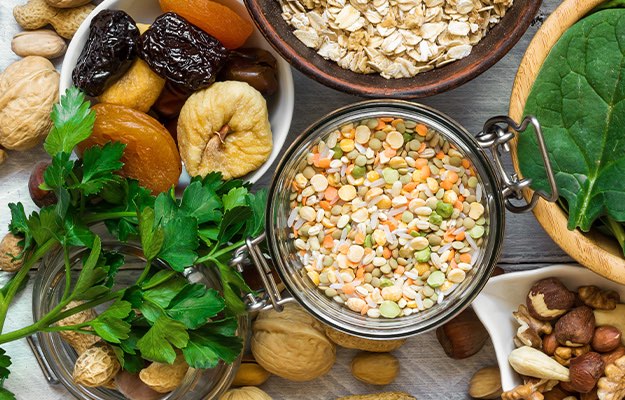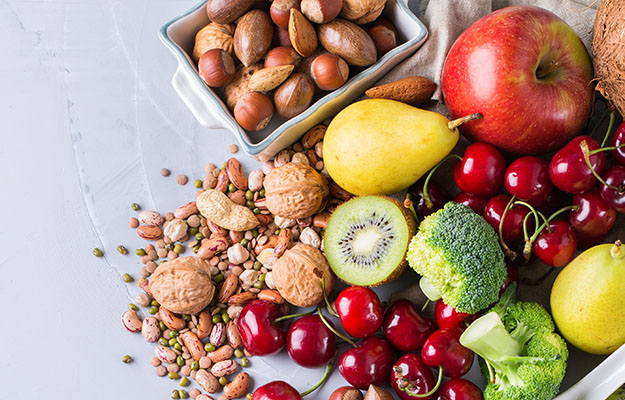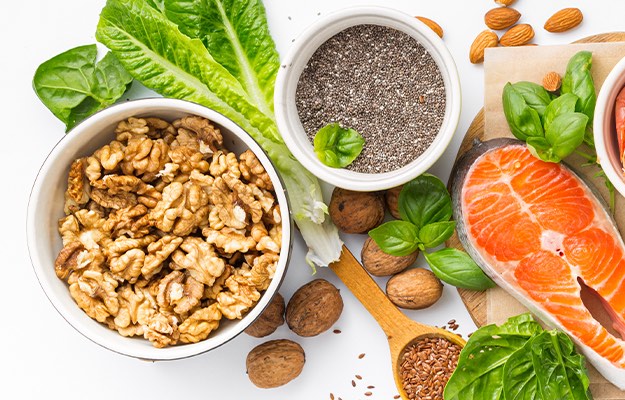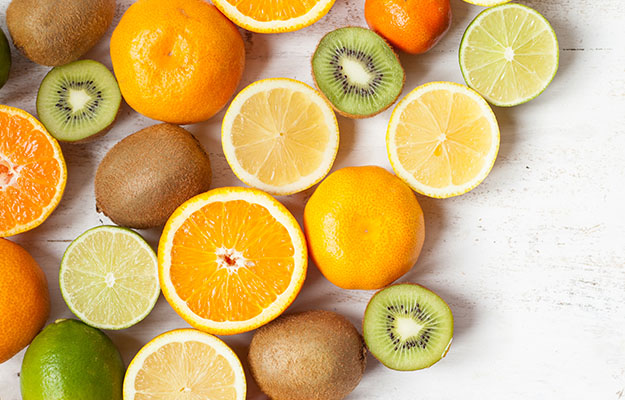A balanced diet is essential for maintaining strong bone health, but obtaining some vital elements in sufficient amounts can be challenging through food alone.
This article explores the impact that vitamins have on strengthening bones. Learn how bone health supplements become crucial allies in maintaining a solid bone foundation, offering the support that diet alone might not be able to provide fully.
Older Adults Need More Than Just Diet to Maintain Strong Bones, Supplements Can Help
#1: Calcium

Calcium is a mineral vital in maintaining the strength and health of bones and teeth. It is the most abundant mineral in the human body, and 99% of the body’s calcium is stored in the bones and teeth, making it one of the most needed bone health supplements.
As people age, the need for calcium becomes more urgent due to the natural process of bone remodeling. As bones age, they may lose density and become more susceptible to fractures and osteoporosis. Calcium helps prevent bone loss and maintain bone density, reducing the risk of fractures and osteoporosis, particularly in postmenopausal women.
Natural sources of calcium include dairy products such as milk, cheese, and yogurt, as well as leafy green vegetables like kale and broccoli.
Various calcium supplements are available for those who may struggle to obtain enough calcium from their diet. Popular brands include:
#2: Vitamin D

Vitamin D is a fat-soluble vitamin that is critical for the absorption of calcium in the intestines. It plays a vital role in maintaining proper calcium and phosphorus levels in the blood, contributing to the formation and maintenance of strong and healthy bones.
As individuals age, the skin’s ability to produce vitamin D from sunlight decreases, and there may be a reduced dietary intake. This can lead to impaired calcium absorption and an increased risk of bone-related issues, such as osteoporosis and fractures.
Natural sources of vitamin D include sunlight exposure, fatty fish (e.g., salmon, mackerel), egg yolks, and fortified foods like milk and orange juice.
To meet the increased need for vitamin D in older adults, supplements can be beneficial:
#3: Magnesium

Magnesium is a mineral that works with calcium to support bone health. It helps regulate calcium transport and stimulates the hormone calcitonin, which aids in preserving bone structure.
Additionally, magnesium is involved in over 300 enzymatic reactions in the body, contributing to muscle and nerve function, blood glucose control, and blood pressure regulation.
Magnesium absorption tends to decrease with age, and older adults may experience inadequate magnesium intake. This can impact bone health, as magnesium deficiency is associated with a higher risk of osteoporosis and fractures.
Natural sources of magnesium include nuts, seeds, whole grains, and green leafy vegetables. For those looking to supplement their magnesium intake, some brands are popular choices:
- Natural Vitality Natural Calm
- Doctor’s Best High Absorption Magnesium
- NOW Supplements Magnesium Glycinate
#4: Vitamin K

Vitamin K is a fat-soluble vitamin that plays a crucial role in bone metabolism and blood clotting. There are two primary forms of vitamin K: K1 (phylloquinone) and K2 (menaquinone).
Vitamin K is essential for synthesizing proteins that regulate calcium within the bones and blood vessels, contributing to bone mineralization and reducing the risk of fractures.
As people age, the ability to absorb and utilize vitamin K may decline, impacting bone health and increasing the risk of fractures. Adequate vitamin K intake is essential for postmenopausal women, as it helps maintain bone density.
Natural sources of vitamin K include leafy green vegetables (such as kale and spinach), broccoli, and fish. For those considering vitamin K supplements, consider:
#5: Zinc

Zinc is a trace element involved in various physiological processes, including bone formation and mineralization. It plays a role in synthesizing collagen, a protein essential for bone health, and is also involved in the activity of bone-related enzymes.
Zinc absorption may decrease with time, leading to potential deficiencies that could affect bone health. Zinc deficiency has been associated with impaired bone formation and an increased risk of fractures.
Natural sources of zinc include meat, dairy products, nuts, and whole grains. If dietary intake is insufficient, zinc supplements can be considered to support bone health, especially in older individuals.
#6: Boron

Boron is a trace mineral that plays a role in bone health by supporting calcium and magnesium metabolism. It aids in absorbing these minerals, contributing to bone density and strength. Boron also helps produce hormones like estrogen and testosterone, further impacting bone health.
Boron deficiency has been associated with decreased bone mineral density, making bones more susceptible to fractures.
Supplementing with boron can be particularly beneficial for postmenopausal women, as it may help maintain hormonal balance and reduce the risk of osteoporosis.
Natural sources of boron include fruits, vegetables, nuts, and legumes. While boron supplements are less common, some brands offer options for those looking to ensure sufficient intake, like:
#7: Vitamin C
Vitamin C, or ascorbic acid, is a water-soluble vitamin with antioxidant properties. While it is often associated with immune health, vitamin C also plays a crucial role in collagen synthesis, a protein that structures bones, cartilage, and connective tissues.
Collagen production naturally decreases with age, and inadequate collagen levels can weaken bones and joints. Vitamin C supports collagen formation, contributing to bone strength and resilience.
Natural sources of vitamin C include citrus fruits (oranges, lemons), strawberries, kiwi, bell peppers, and broccoli. Popular vitamin C supplements include:
#8: Vitamin A

Vitamin A is a fat-soluble vitamin essential for bone growth and development. It supports the activities of osteoblasts, cells responsible for bone formation.
Also, vitamin A regulates bone resorption, the process by which old bone tissue is broken down and replaced with new bone.
The need for vitamin A becomes more crucial as people age due to its role in maintaining bone density and preventing age-related bone loss. Vitamin A deficiency can lead to impaired bone growth and increased fracture susceptibility.
Natural sources of vitamin A include liver, sweet potatoes, carrots, spinach, and kale. For those considering vitamin A supplements, look for brands like:
#9: Vitamin B12

Vitamin B12, or cobalamin, is a water-soluble vitamin that plays a crucial role in bone health. It plays a role in producing red blood cells, which transport oxygen to the bones and tissues. Vitamin B12 also helps maintain the myelin sheath, the protective covering of nerves.
As individuals age, vitamin B12 absorption in the stomach decreases. Vitamin B12 deficiency increases the risk of osteoporosis and bone fractures.
Supplementation can be essential for older adults, especially those following vegetarian or vegan diets, as B12 is primarily found in animal products.
Natural sources of vitamin B12 include meat, fish, dairy products, and fortified cereals. Popular vitamin B12 supplements include:
#10: Omega-3 Fatty Acids

Omega-3 fatty acids, including EPA and DHA, are essential in fatty fish and some plant sources. These fatty acids play a crucial role in bone health by reducing inflammation and supporting bone density.
Omega-3 fatty acids have anti-inflammatory properties, which makes them increasingly important as people age. Chronic inflammation is linked to bone loss and conditions like osteoporosis. Omega-3 fatty acids help regulate the inflammatory response, contributing to overall bone health and reducing the risk of fractures.
Natural sources of omega-3 fatty acids include fatty fish (salmon, mackerel, sardines), chia seeds, flaxseeds, and walnuts. For those considering omega-3 supplements, consider:
Bottom Line
Maintaining healthy bones becomes increasingly essential as individuals age. While these nutrients can be obtained through a balanced diet rich in dairy products, green vegetables, nuts, and meats, bone health supplements can provide additional support, ensuring that the aging population receives the necessary nutrients for optimal bone health.
*Consult with a healthcare professional before starting a bone health supplement regimen.
UP NEXT:


